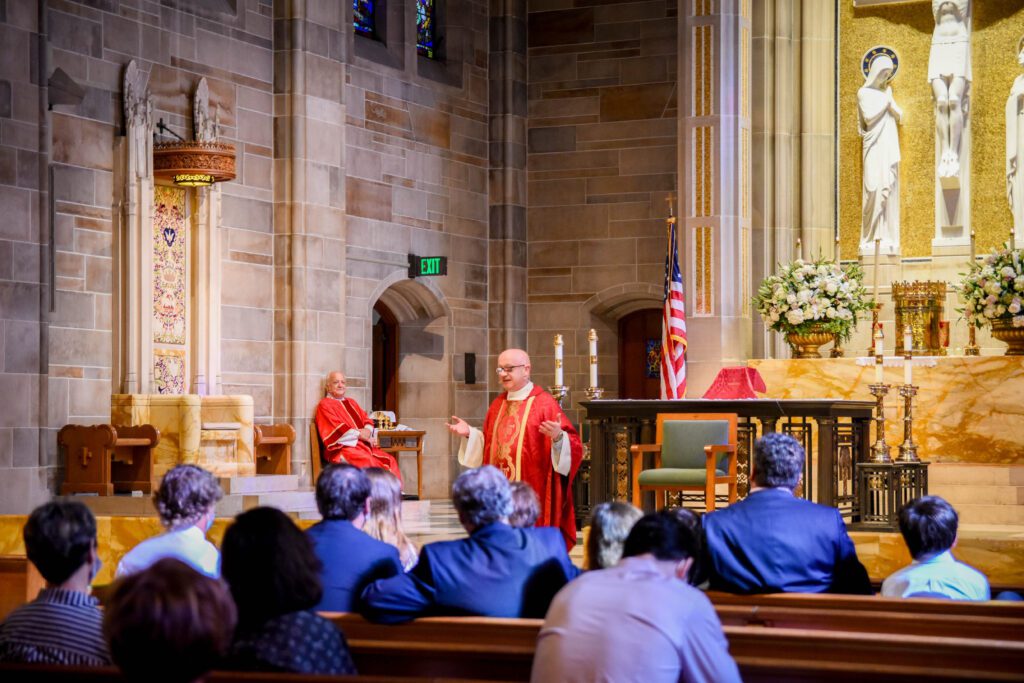
My friends in Christ,
As we sought to minister this past year, our question was not “can we?” but “how do we?” Trusting the Holy Spirit and the advice of public health professionals, we made whatever adaptations we needed to in order to provide the grace of the sacraments, preach the Gospel, and serve those in need. And needs were many.
I’m grateful to our staff for all of their extra efforts and for their flexibility in adapting ministries to the demands of the time.
We were able to do this because of the ways you supported our parish with your gifts of time, talent, and treasure. Those investments enabled our ministries to persist in the pandemic and meet the new needs of our parish and our broader community.
Yours in Christ,![]()
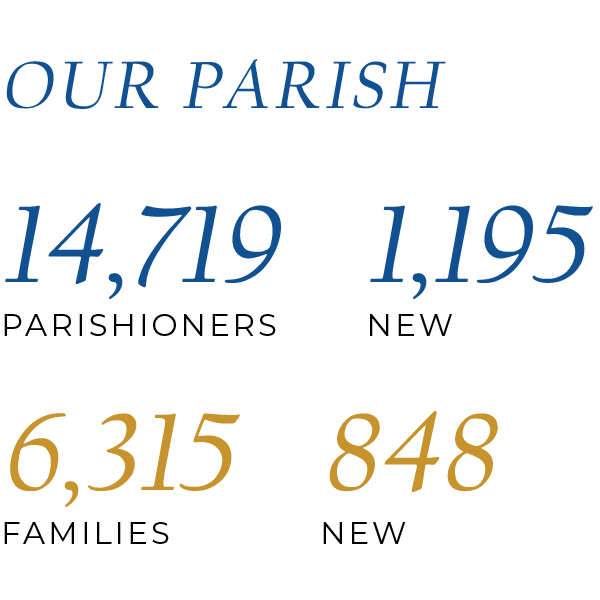
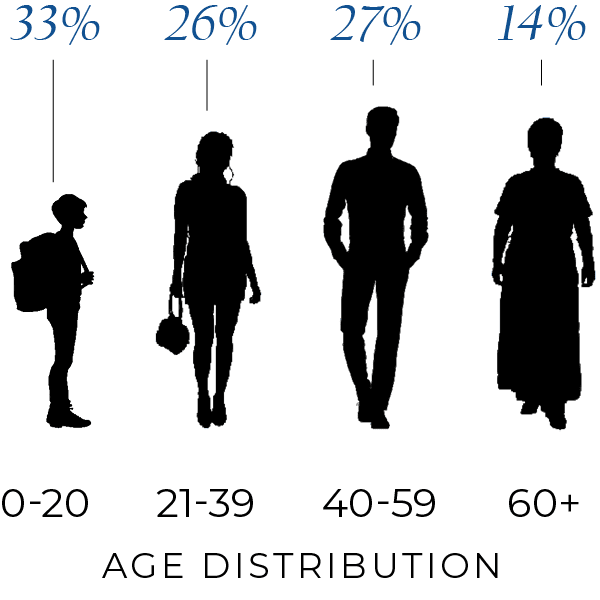
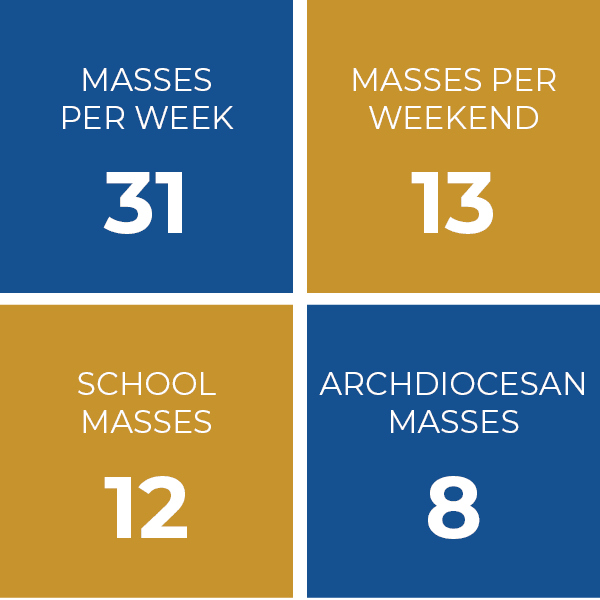
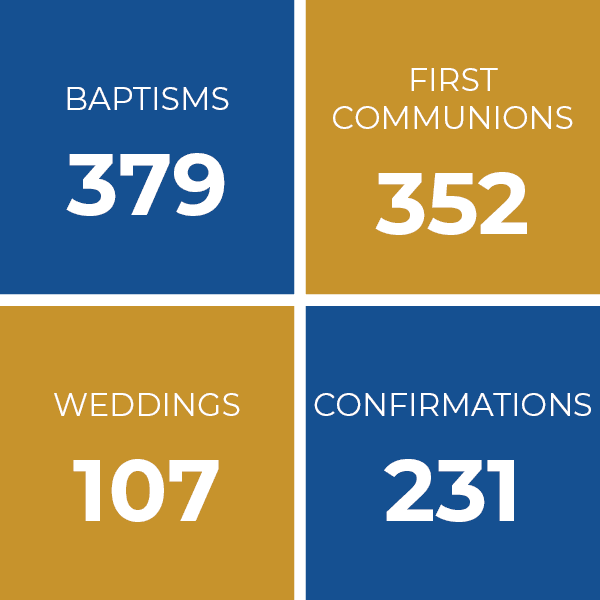
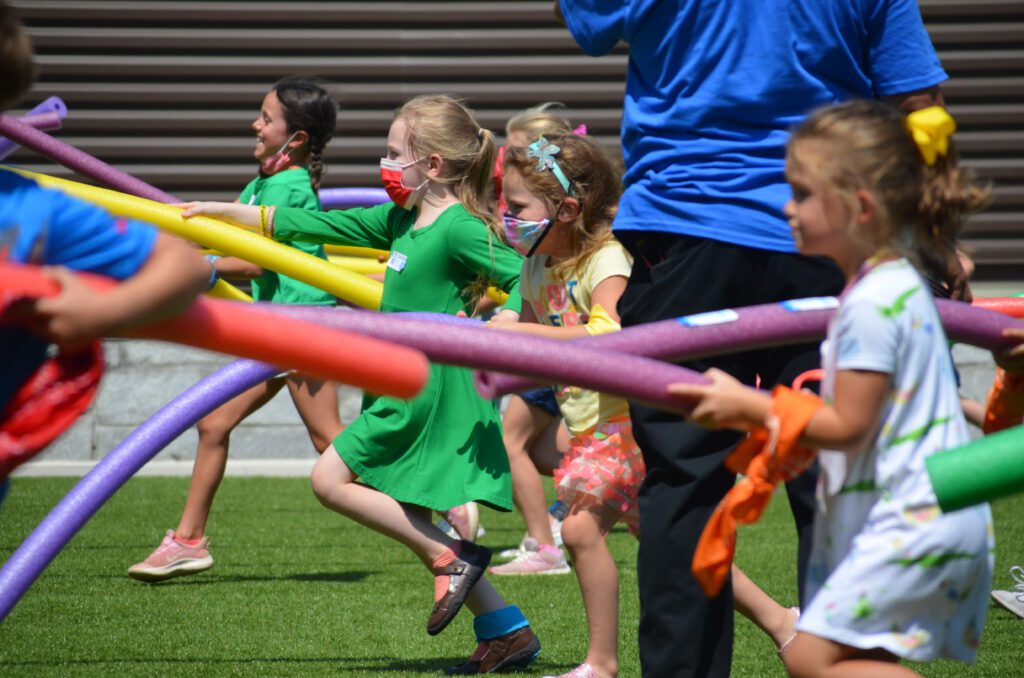
Whatever It Takes: How the Hyland Center Enabled Ministry
When we built the Hyland Center, we didn’t know what a blessing it would be under the cloud of COVID-19. Over several years, our parish raised an astonishing $31 million dollars to construct the complex of recreation, meeting, and multipurpose spaces. We knew it would accommodate the needs of our parish and school – holiday Masses and middle school classes and basketball leagues. We didn’t anticipate that it would enable our church ministries to thrive in the middle of a pandemic.
For all sorts of reasons, many parishes didn’t host their normal programs in 2020-21. Nearly all parishes struggled to find enough volunteers; for many parishes though, it was ultimately a problem of facilities that were inadequate to surmount the risks of COVID.
“When things began opening up last year, our question was not if, but how we’re going to continue,” said Bernadette Flowers, CTK’s associate director of adult faith formation. “How can we safely gather?” The logistical questions stacked: how do we gather but socially distance? How do we clean our facilities? How do we move students around? Will visitors cooperate with our safety procedures? The Hyland Center helped answer some of those questions.
“My family and I felt so fortunate that CTK put the effort into making in-person Parish School of Religion instruction possible last year,” said Katie King, whose daughter was enrolled in PSR. “The mitigation strategies were well-thought-out and -executed. We felt very safe having our daughter attend in-person.” Those strategies included wearing masks, limiting access to classrooms, individual supply bags, and temperature checks. It also included reworking how students met. “We used to use classrooms twice, once at 9:00 AM and again at 10:30 AM,” said Elaine McCollum, CTK’s associate director of family and children’s ministries. Spanish-language PSR met on Saturday afternoons. “This year, with the Hyland Center, we could use classrooms just once, and were able to spread our students out.”
The efficacy of those strategies paved the way for us to host our first Vacation Bible School since 2017, before the original Hyland Center was demolished. Eighty-three students divided into small groups were able to study Bible lessons in the gym, complete crafts in the multipurpose room, play in several of our outdoor recreation spaces, and snack in the cafeteria. The Hyland Center allowed ample room for students to spread out.
Celebrating First Reconciliation with our 2nd-grade students was challenging. Normally celebrated in the Cathedral, this year the sacrament was moved to the Hyland Center where families could spread out across the mezzanine, bleachers, and gymnasium floor. “It worked great – it actually gave parents a better view of their child,” Elaine said.
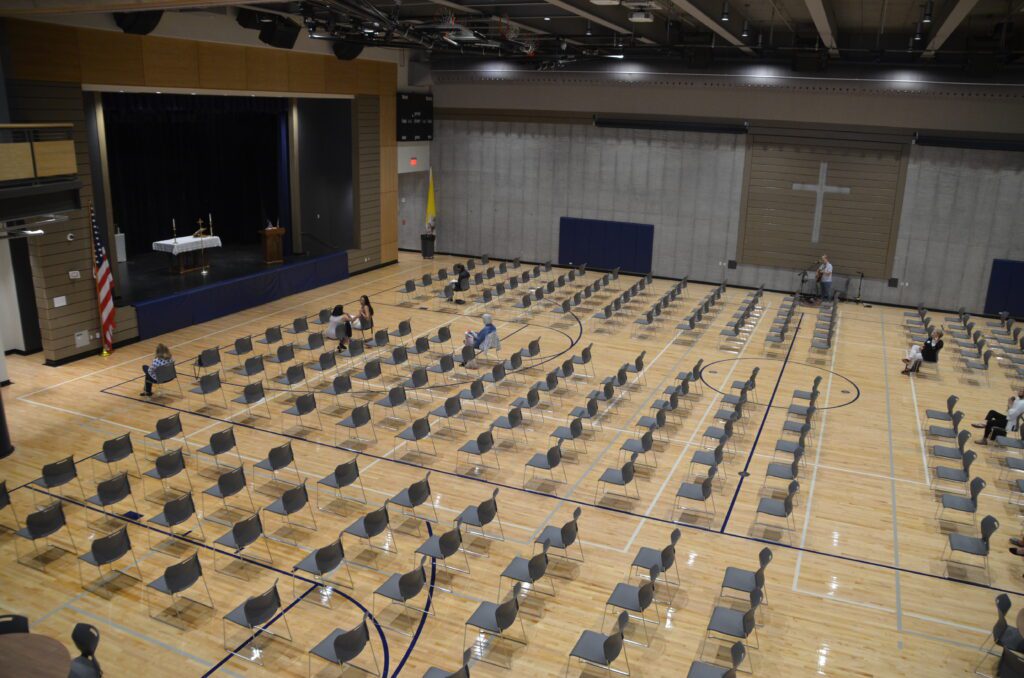
We also relocated our two annual Penance evenings, celebrated during the penitential seasons of Advent and Lent, to the Hyland Center. “We were concerned about crowding in the Cathedral,” Bernadette said. “We were able to spread out priests and confession spaces across all three stories of the Hyland Center.”
Young Church, our ministries for middle- and high-schoolers, certainly relied both on the Hyland Center and our outdoor spaces to facilitate ministry. In summer 2020, with their normal summer trips and retreats canceled, Young Church organized several outdoor get-togethers for students. “We picked games that weren’t high-contact, like soccer,” Kate Curran, associate director of youth ministry, said. “We wanted to facilitate ministry in the safest environment possible.”
Pre-COVID, students would crowd into Kenny Hall and the youth room in the Ministry Offices. This year, Young Church scattered across campus – in the cafeteria, throughout the Hyland Center, and “where possible, going outdoors, where masks weren’t required,” Kate said. “We really wanted to facilitate face-to-face interaction.”
A big test for Young Church was organizing its annual retreat for students preparing for Confirmation – that’s well over 100 students. Held in January during a peak of COVID transmission, outdoor gathering wasn’t an option. We ultimately settled on an online retreat, with a key exception: “to open the retreat, students were invited to the Hyland Center for an evening of Adoration of the Blessed Sacrament and Reconciliation. Every floor and space was used.” said Kate. She added, “A big hats off to donors for the gifts they made, so we could have this building when we did.”
Knowing God in 2021-21
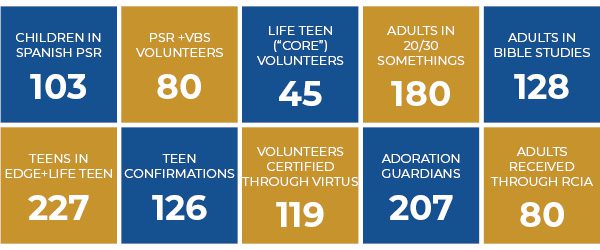
A COVID-Caused Crisis: Ministering to grief and isolation in the pandemic
When the pandemic began, our Pastoral Care team knew immediately that those they serve would be especially hard hit. The team met via conference call several times per day to brainstorm ideas so they could mobilize their team of volunteers to reach out to the most vulnerable.
Grief classes used to run 10 weeks. Now, they’re running 15 months.
Linda Dyson, Pastoral Care Associate, called on her Stephen Minster team, which provides care and counseling to people in crises – death, loss, grief, and isolation. Linda Dyson was aware that the need for help was increasing and there were some who were unable to reach out for it.
COVID-19 compounded existing crises, separating people from existing support structures and isolating them. The effects have been apparent in CTK’s ministries that respond to those crises. “Clients waited longer to reach out to us for help, and the intensity of their pain was greater,” Linda reported. “By the time they reached out this past year, sometimes their crisis was so great, we weren’t able to meet their needs and had to refer them to The Holy Family Counseling Center.”
Since the 1990s, trained volunteer Stephen Ministers have met one-on-one with people experiencing grief, loss, or other difficulties. Those relationships usually last 6-8 months. “Because people’s pain is generally deeper and the need for spiritual support is more evident today, those relationships are now lasting over a year in many cases,” said Linda. She recruited more Stephen Ministers for crisis ministry, and began offering telecare for those who needed prayer and a loving, listening ear. Several Stephen Ministers also volunteered to spearhead “Random Chats of Kindness,” a phone ministry where they reached out to people who needed to feel greater connection with the parish community.
The pandemic also unmoored those who were grieving the loss of a loved one. “Initially, people weren’t able to include a large number of guests at funerals,” Bernadette Flowers, associate director of adult faith formation, observed. “People died, but their families didn’t have the normal mechanism for grieving and getting care from those who love them.” Where some funerals fill the Cathedral, state and local mandates limited the number of people present. Unique circumstances compounded people’s grief and required our bereavement ministries to adapt to meet their needs.
CTK expanded its grief ministries to support families through the stages of grieving. Pre-COVID, CTK would provide grief classes with 7-10 people that would run about 10 weeks. Demand for those classes soared during COVID. The parish has run multiple grief classes at a time, some with as many as 19 people. We’ve had to expand the duration of grief classes to as long as 15 months. We’ve expanded the previous curriculum, adding more in-depth group sessions that minister to all stages of grief in order to help those in grief journey closer to discover meaning beyond grief.
Through the adaptations ministries have made, Linda is seeing transformation. One participant who lost their spouse has channeled their grief into remembrance, commissioning mosaic benches at a favorite shrine in their spouse’s memory. Two grief class participants have been commissioned as Stephen Ministers, wanting to accompany other people through their trials.
Linda gets texts from grief class participants that affirm the work they’re doing. “I don’t know what I would have done without this group,” one reads. “I don’t think I would have made it through without you leading the way.” Another reads, “There has to be some good in our lives despite all the pain and sadness we feel. Leaning on each other is maybe one of the gifts we can give each other.”
Old-fashioned pen and paper
While the pandemic created a whole new way of communicating via Zoom and working from home, there was a huge void for the aging population who cannot always access these new technologies. Pre-pandemic, a team of Pastoral Care staff and volunteers made regular visits to those who could not visit campus due to age or health reasons. This included parishioners, often senior adults, in nursing homes, hospitals, assisted-living centers, and personal residences. COVID restrictions at nursing homes and hospitals barred Pastoral Care from making those visits.It was a dark time for many residents, isolated from friends and family and unable to visit with their own neighbors and hallmates because of their facilities’ restrictions and their own health concerns. Recognizing the crisis, Jan Riser and Susan O’Rielly, pastoral care associates, and their volunteers reinvented their approach to ministering.
“We made hundreds of phone calls last year,” recalled Susan. They searched the church’s database for people they thought might be vulnerable or lonely during isolation. “We learned people were undergoing cancer treatment, needed help, or just needed to talk,” said Jan. “We were able to get them assistance, provide comfort and pray for them.”
I personally was at a low point. Your packages were … beautiful. I really feel a part of the church. My heart is open to my faith and I have you to thank!
F.O.
Cards also made a meaningful connection. “We sent birthday cards, bereavement cards to parishioners who have experienced death, Christmas and Easter cards, ‘thinking of you’ cards to those in nursing homes,” said Susan. This past year, CTK’s volunteer Card Ministry sent over 2,100 cards. Pastoral Care sent another 675 cards. They also sent out hundreds of Spiritual Communion cards for those unable to receive Communion.
The most impactful connection we made this year may have been between Marist students and senior parishioners. Susan bumped into her friend Mary Ujda, a campus minister at Marist. “We were talking at a cross country meet, and Mary needed some service projects for the students this year that were not in-person,” said Susan. The two came up with an idea – ask students to write to quarantined parishioners. And they did – during the 2020-21 school year, students wrote over 2,400 letters to quarantined seniors, which Jan and Susan sorted, packaged with Sunday bulletins and other gifts, and delivered every other week to assisted living centers.
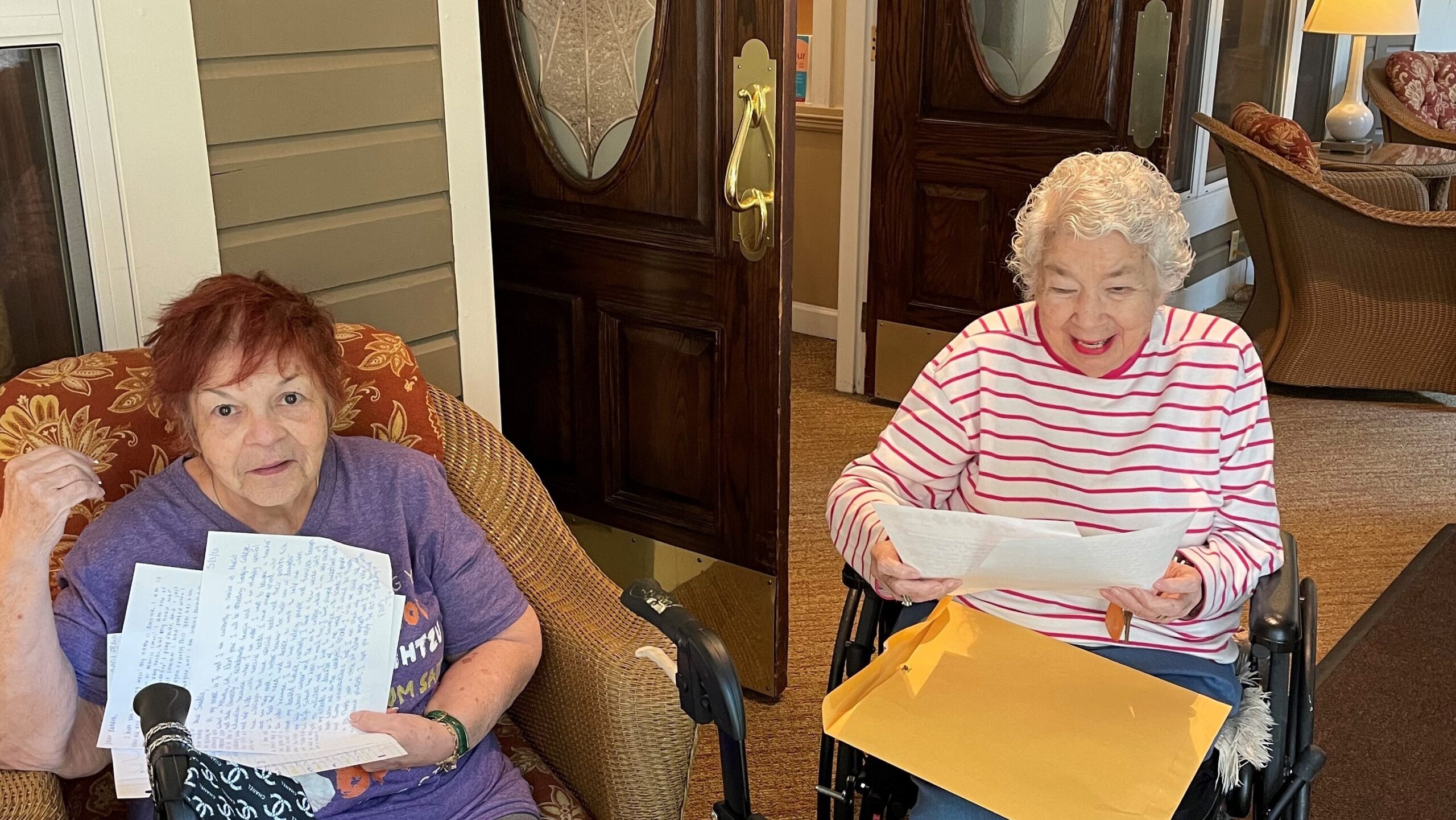
“It has really taken off and been a great project. The letters have been very touching, especially the ones by high school seniors,” said Susan. “Honestly, the elderly seniors have mentioned how well written many of them are. It’s so rare for teenagers to write letters these days!” Many Marist seniors wrote about how difficult the year was for them due to COVID, and about their excitement and concerns about their future. It was cathartic for the students to express these emotions, while also expressing concern about the impact of COVID on those reading the letters.
“It’s been a real blessing for our school community as we re-think what it means to reach out in a meaningful way to others,” Mary Ujda said. “Some of the parishioners have written back, and I love delivering the mail to unsuspecting students in class!”
I wanted to thank you so very much for all the letters you sent from the girls and boys at Marist High School. I have read them many times over.
M.G.
“I cannot express how much this has meant to these residents,” Susan said. “We get phone calls and ‘thank yous’ almost daily from people about these letters. Last week at a Communion Service, two men broke down expressing how much the letters have meant to them.” The letters provided a much needed diversion during a difficult year. We look forward to continuing this partnership with Marist this year.
A sense of normalcy
Adults weren’t the only ones hurting during the pandemic. Facing quarantines and isolation during a crucial period of their social development, students were also grappling with increased stress during the pandemic. Some students struggled with online schools, “spending all day alone in their rooms on their computer screens,” Kate Curran with Young Church, our teen ministry, described. “Other students were in and out of quarantine constantly because of athletics or exposure to the virus,” she said. “Some students were quarantined easily 5-6 times, which meant 12 weeks of quarantine over a school year.” For those students, that meant being away from school for a third of the school year.
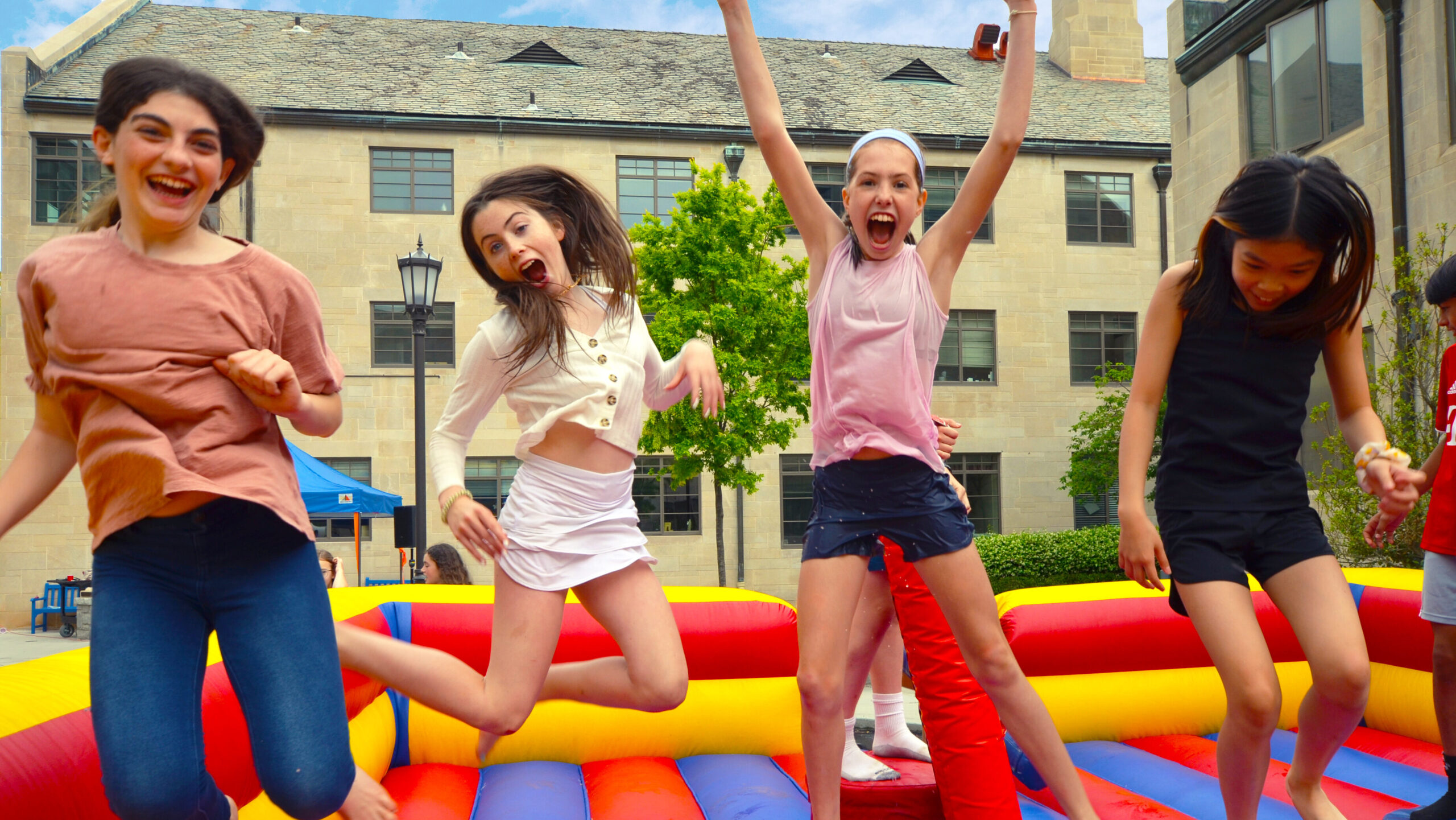
For our children’s and youth ministries, it was a priority to provide positive, in-person experiences for students. “We were striving to provide some sense of normalcy despite the pandemic,” said Elaine McCollum, associate director of family and children’s ministries. “Where possible, we planned on going outdoors where masks weren’t required and we could facilitate face-to-face social interaction, which our students were missing out on,” said Kate.
The pandemic also disrupted students’ normal church routines, so creating spiritual encounters was also important. “Take our students preparing for Confirmation,” said Kate. “For some of them, their only times going to Mass this year was at the Confirmation retreat and at Confirmation.”
“Our students have learned the importance of being with people, of community,” said Kate. “They’ve learned that the Cathedral is a community that’s there for them.”
Loving God in 2021-22
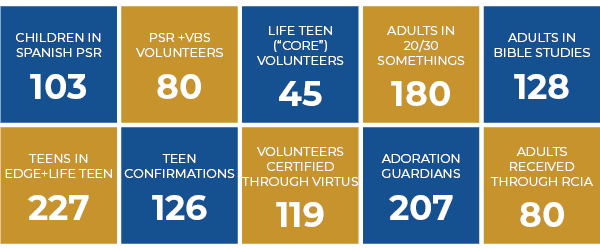
‘Tremendous Courage’: Serving the Church in the Time of COVID
“We absolutely couldn’t have done what we did this past year without our volunteers.” That’s the consensus of CTK’s staff, from liturgy to faith formation to pastoral care. “Without their service,” said Kate Curran, associate director of youth ministry, “our ministry would be virtually impossible!” Choosing to serve during the pandemic was a brave choice.
Welcoming the nervous
Laura and Lee Berg have been parishioners for decades: Laura was baptized at Christ the King, and Lee entered the Church through RCIA almost thirty years ago. For decades, they’ve been part of the team that helps make the 9:00 AM Mass on Sundays happen, Laura as a Eucharistic minister and Lee as an usher. When the Cathedral reopened Masses last summer, the Bergs didn’t hesitate to return. “We wanted to be safe, but at the same time, we missed the Eucharist,” Lee said. “Virtual church just wasn’t doing it for us. It wasn’t the same.”
As part of the usher team, Lee was key in enacting the protocols that made Mass possible in the first place – social distancing, masking, sanitizing. “It felt really important, that we better get this right. We really took the protocols seriously, “ he said. “We were trying to facilitate visitors’ spiritual lives, but we also wanted to keep them safe.” Laura felt similarly, “There were so many unknowns about COVID. I think the church did a fantastic job of keeping things safe. I never felt afraid.” Most visitors to the Cathedral seem assured as well. “A few are concerned and want to make sure they can sit on the back row, with a little extra social distancing,” Lee observed. “All in all, I feel like it’s gone extremely well.”
It felt really important, that we better get this right. We really took the protocols seriously.
Lee Berg
One challenge the Bergs have faced is that there haven’t been enough Mass volunteers to support Masses during the pandemic (the Bergs noted that three long-time ushers at the 9:00 AM Mass passed away this past year). A core group of ushers and Eucharistic ministers continued serving during COVID with a keen sense of responsibility, a love of the Mass, and Christ the King. “I was a waiter in college – ushering is like being a waiter for the ultimate feast!” Lee said. “I love being a part of this ministry,” said Laura, “I’ve grown so close to other volunteers, I feel like I’m at home. It feels like such a blessing to be able to do what I can do.”
The Cristo Rey Mission was also reliant on its volunteers as it celebrated Masses. “It is a great privilege for me to serve as a lector in our Mission community,” said Janeth Lopez, who coordinates lectors for the Mission. She also saw some hesitation when inviting volunteers to serve at Mass. “There was some uncertainty, fear, and discomfort with the guidelines,” she noted. “Some volunteers decided to take a break as a precaution for themselves and their families.”
Soccoro Tellez helps coordinate ushers for the Mission. “For me, there were moments of uncertainty. But at the same time, I was motivated to learn how to serve in new, unique, and different ways.”
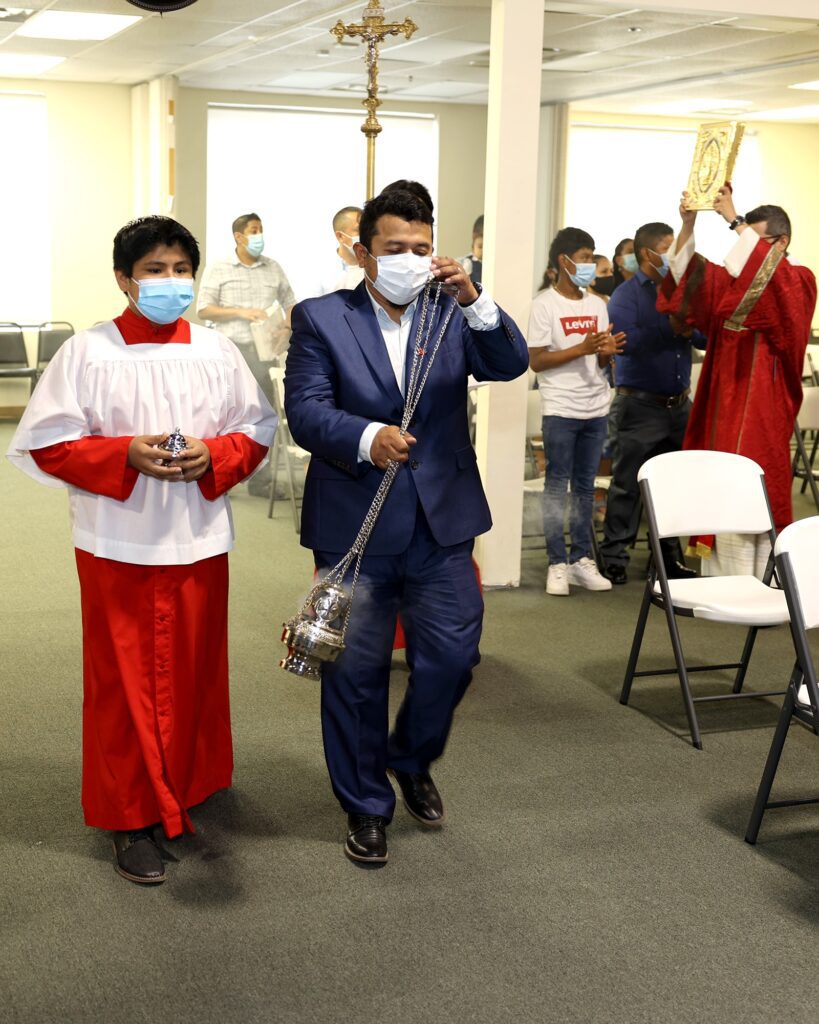
Finding community
Margie Vanden Heuvel had already volunteered in religious education when she saw an ad in the bulletin asking for RCIA sponsors. “You hear these stories of how everyone’s leaving the Church,” she said. “I think it’s great when people want to join.” RCIA sponsors commit to accompanying someone as they discern joining the Catholic Church – they attend RCIA events with the person they’re sponsoring, and answer their questions about living out a Catholic faith.
“It’s a much better use of Sundays than sleeping in and reading the paper!” Margie said.
RCIA programs never stopped when COVID came. They persisted, sometimes as an online class, sometimes as a hybrid approach with in-person and online attendees. Margie and her mentee were part of the online cohort during COVID. “Something wonderful happened in the middle of all this,” she reported. During RCIA meetings, attendees break into small groups for discussion. Because the online cohort was small, they just had one small group, the same people week after week. “We really got to know each other,” Margie said. “We were all helping each other outside of RCIA: when someone’s mom got diagnosed with cancer, or had issues with their children. We were all praying, and things did get better!” That group remained close even after they completed RCIA. “We’ll still text each other.”
Margie’s now gone through three sessions of RCIA, with three different mentees. “You get more out of it, watching people grow and learn more about our faith,” she said. “It makes me want to be a better Catholic!”
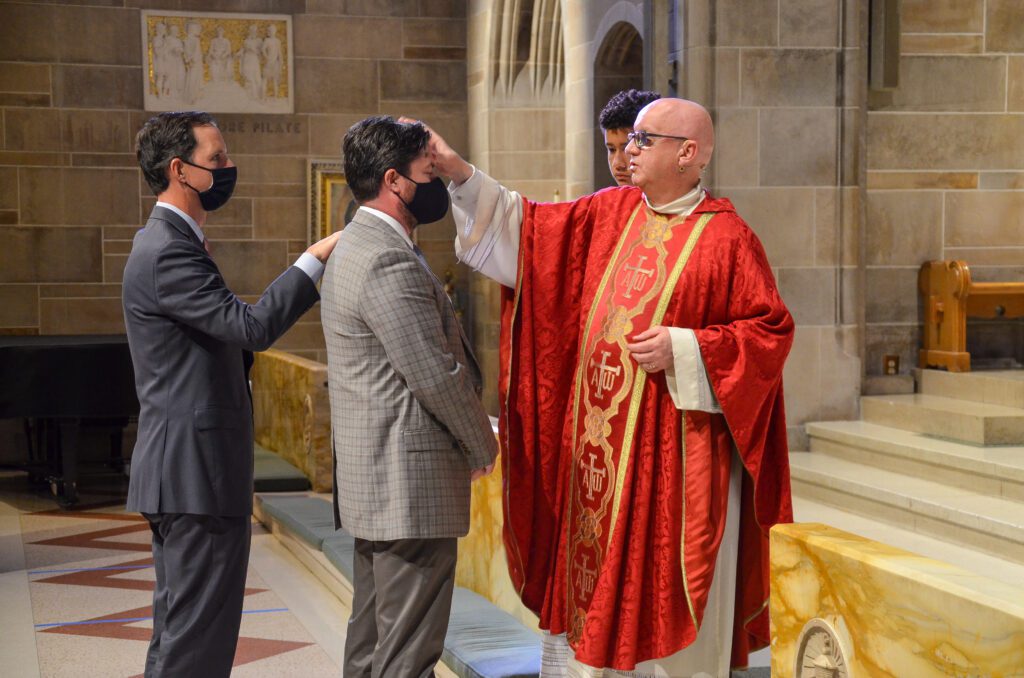
Trusting God
“Any person who volunteers to serve young people is tremendously courageous,” says Kate Curran. “Everyone wants to leave middle and high school behind, but our CORE volunteers are willing to revisit that time in their lives.” CORE volunteers are mentors over small groups of middle and high school students in CTK’s EDGE and Life Teen programs. According to Kate, they’re usually young professionals “who have had a deep encounter with the Lord and want to serve him.”
They are people like Gabrielle Cowand, who has served for four years as a CORE volunteer, since graduating from the University of Georgia. “When you walk into a room with middle- and high-schoolers, you have to remove any pride you have,” she said. “Trying to show them Christ requires a good bit of vulnerability. I think they respond well to that.”
When Life Teen resumed in the fall of 2020, Gabrielle wasn’t sure about serving. “A lot of us didn’t know what to expect,” she said. “I was hesitant about if I wanted to come back. I’m really glad I did.” At a time when students were stuck in online school and dealing with quarantines, Young Church adapted a lot of their usual plans to create a stable, semi-normal environment for students. “I was really impressed with how we were still able to keep our programming intact.”
Even with protocols in place, the CORE team still had to adapt to plenty of challenges. When their planned in-person Confirmation retreat had to be moved online, they scrapped their planned small group activities. They met with their small groups on Zoom. Gabrielle remembers, “We had to lift it up to God and pray, ‘we don’t know what we’re doing, but whatever You’re going to do through these computer screens, we trust You.’”
For Gabrielle, volunteering is about showing teens that the Church cares for them. “We don’t need to have big ‘come-to-Jesus’ moments with every teenager,” she said. “Being one source of light in simple moments can make a big difference. It’s one of my favorite things about Life Teen.”
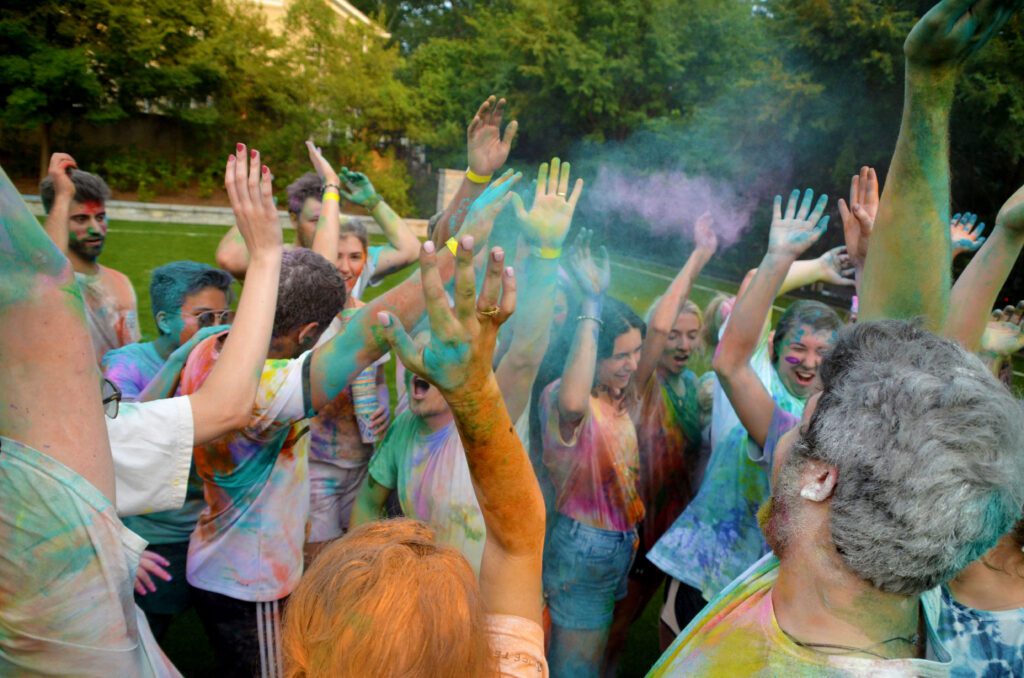
Serving God in 2020-21
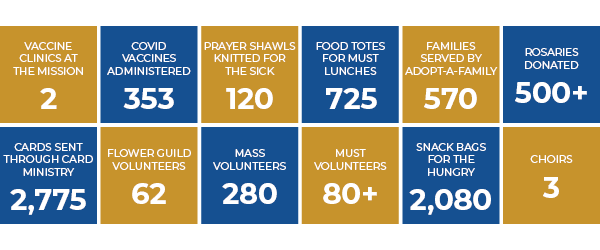
A Hybrid Approach: How Technology Made CTK More Inclusive

Since last summer, as we’ve gained confidence in our COVID protocols, the Cathedral has slowly resumed its in-person operations: first Masses, then other sacraments, followed by a rollout of ministries that could support social distancing and other safety procedures. But not everyone has been able to return in-person, and not everyone has been able to consistently be on-campus, contingent on the challenges of personal health, exposure to the virus, and surges in infections. So how do we include as many people as possible? How do we minister to immunocompromised families and to parishioners confined at home? We’ve employed a wide range of technologies to reach out to our parish family, which in many cases has resulted in a hybrid approach to our traditional programs.
Livestreaming has been indispensable in connecting homebound people to Mass. This year, with the support of Archbishop Hartmayer and the Archdiocese of Atlanta chancery, we’ve been able to upgrade from a two-camera system to a dynamic 5-camera system, allowing people to more intimately participate in the Mass from home. “Offering live stream masses has been a grace for sensitive populations,” said Jessica Damian, a parishioner whose family hasn’t been able to return to Mass. “It is a blessing to see the altar and what happens at the Lord’s table. As a Catholic, I feel a true sense of communion being able to see Christ.” When families weren’t able to gather for milestone moments like weddings, funerals, and first communions, the Cathedral was able to live stream those liturgies as well. “I can only imagine how much the live stream means to the elderly, hospital patients, and immunocompromised families like ours,” Jessica said.
Families experienced this hybrid approach while preparing for sacraments. Pre-COVID, baptism preparation classes for new parents saw 30-40 people and their newborns meet in a conference room on-campus. This year, we canceled those in-person classes and created on-demand video content coupled with questionnaires that parents completed at home. We limited baptisms to private ceremonies with just a few family members – but Monsignor Frank encouraged families to include their families in whatever way they could, including calling their loved ones on FaceTime during the ceremony to share it with them.
I’m sure that the Zooming kept her going a lot longer than she would have been able to!
Sam Buchanan
Many ministries leaned solely on video conferencing to meet: St. Vincent de Paul, Men’s Club, and Believes. At the Mission, two prayer groups, Apostoles de la Palabra and Grupo de Oración Carismático Católico, met online exclusively for six months. The Cathedral Bible Study for Women (CBSW) planned a hybrid approach. They shifted from weekly in-person meetings to biweekly (meeting every 14 days, which built in a kind of quarantine in case anyone contracted COVID). They also invited people to attend via Zoom, and when in-person attendees broke out into small groups, the Zoom attendees met as their own small group. Pat Buchanan, a member of the CBSW study, passed away in March 2021 after a cancer diagnosis. She was able to join the Bible study via Zoom while undergoing treatment. “She loved her bible study,” said her husband, Sam Buchanan. “I’m sure that the Zooming kept her going a lot longer than she would have been able to!”
Hesitant about in-person gatherings, Spanish PSR offered classes on Zoom. About 45% of families in the English-language Parish School of Religion opted for a home curriculum in 2020-21. Using Google Classroom, an online education platform, we created an online curriculum for parents to complete with their children, including links to videos, music, and games, as well as online quizzes to assess student progress. For our youngest PSR students, we also filmed video lessons.
Given the winter surge in COVID cases, we opted to shift our annual Advent and Lenten mission to an online format. Our Lenten Mission premiered live on Facebook over three nights in late March, led by CTK staff Linda Dyson, Bernadette Flowers, and Kathy McCormick, who were also present in the chat responding to questions and fielding prayer requests. Those Facebook premieres averaged around 80 viewers each night, and reached almost 900 people in total. Posted on Youtube, each night of the Mission averaged 83 views from people who watched it later on-demand. “We had more people engage with our online Lenten mission than our last two missions combined,” said Bernadette Flowers. “Being closed for COVID has really helped us adapt to changing needs of our parish family.”
As the pandemic continues and people grow accustomed to – and rely on – online ministry, we expect to continue a hybrid approach to some programs. This year, we’ve invested in a professional Zoom account and Owl Pro, a 360-degree camera designed to create the experience of in-person participation in our ministries. We have adapted our conference rooms to better manage a combination of in-person and online attendees.
Reaching God’s People
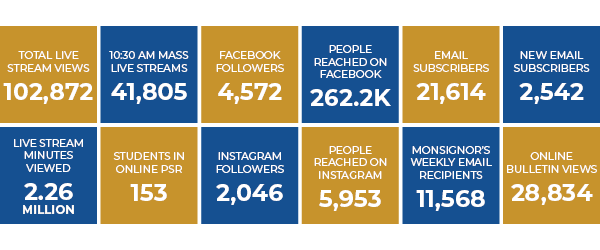
IN GRATITUDE: Three Giants of the Cathedral Retire

Chris Brown, Facilities
Chris Brown, who maintained our campus for over two decades as our director of facilities, retired in December 2020. We wanted to honor him as a community for his incredible service.
Prior to becoming the facilities manager, Brown was in the ice cream business. “I owned Baskin-Robbins’ franchises for 15 years,” he said. His wife, Janet, was a physical education teacher at Christ the King School, and he learned of the facilities position there. “It’s just a fun place to work,” said Brown. “It’s a dynamic church with a dynamic, thriving school.”
Chris supervised a team of facilities staffers at both the campus and school. “I’m the only person who works for both,” he said.
Chris enjoyed being part of the the buzz of everyday activities. “One of my favorite things is to walk through recess,” said Brown. “If you get hit by a ball, it’s your fault.”
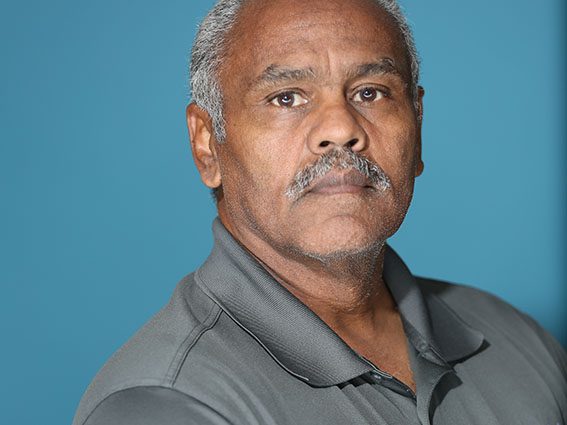
Leroy Chaney, Facilities
After over thirty years on our facilities team, Leroy Chaney retired in June 2021. “End of an era!” wrote Chesley Turner. “Leroy started when I was in second grade. I remember Ms. Bottoms introducing him to our class. Thank you, Mr. Chaney, for making CKS a kind and welcoming place for little ones to grow up and know what community feels like.”
His retirement is a blow to the ministries he’s helped over the years. Judie Wirtz wrote “Leroy, You have always been there to help the Flower Guild, and done it with a sweet smile!” And that may be his legacy at CTK – his smile. “He always had a smile and kind, genuine words,” said Cecilia Muzik. On hearing of his retirement, Bill Letts wrote, “I will miss seeing his smile around CTK.”
We’re so thankful for all Leroy has done over the decades to make the Cathedral beautiful and enable our events to happen.
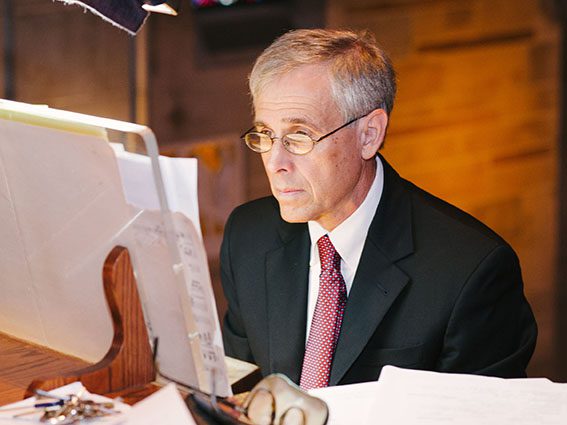
Tim Wissler, Organist
After 35 years as Cathedral Organist, Dr. Tim Wissler retired in May 2021. Tim joined the Cathedral staff in 1986, when he was already established as the Chair of Fine arts at Mercer University, and a member of the organ faculty at Georgia State University.
Some of Tim’s most notable work has been in the formation of our students. It was Tim that established the Cathedral’s Boy and Girl Choirs, as well as a handbell choir for high school students and adults. “Tim really emphasized high-quality singing,” recalls Ham Smith, director of music emeritus. He also founded the annual Archdiocesan Children’s Choir festival and the Archdiocesan Choir Camp.
Tim also worked extensively with traveling choirs, arranging for such groups as the Westminster Cathedral Choir to perform at Christ the King. He accompanied Christ the King’s choir in its Italian tour.
Tim’s own favorite part of his position at Christ the King has been working with thousands of families planning weddings and funerals – accompanying them in their joy and their grief as they prepare for a milestone moment in their lives. “He has a gift for gently leading them to the right music,” Ham Smith noted.
Helping our Neighbors: Campaigns Sought Relief for Atlantans
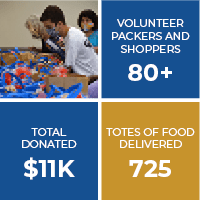
CTK Provided 725 Totes of Groceries through MUST Ministries
For many children, summer vacation begins a period of food insecurity. We partner with MUST Ministries to provide nutritious summer lunches to thousands of children in the metro Atlanta area. COVID-19 severely impacted food security in Atlanta last year, so MUST adapted its annual program to supplement family grocery needs. Through your generous support in June and July 2020, our parish family raised over $11,000 and provided 725 tote bags of groceries for children and their families. We’re especially grateful to the Knights of Columbus, who made a $4,500 donation to the program.
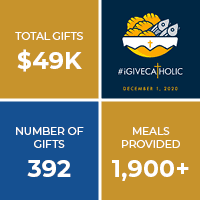
iGiveCatholic Provides over 1,900 Meals
This Thanksgiving, the Cathedral and Christ the King School sponsored a Giving Tuesday campaign to support the Compassion Kitchen Project, which connects struggling restaurants with hungry Atlanta families struggling to provide food for themselves. Thanks to almost 400 supporters, we nearly doubled our original goal of providing 1,000 meals, raising $49,293, enough to provide over 1,900 meals to hungy families.
The campaign was part of iGiveCatholic, a national Giving Tuesday project to raise funds for Catholic causes. More people supported this project than any other iGiveCatholic project in Atlanta. Learn more about CKP at https://cathedralctk.com/compassionkitchen.
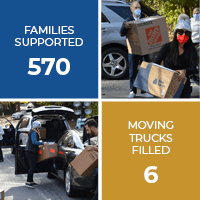
Adopt-A-Family Hosts Christmas for Record 570 Families
Each Christmas, we sponsor the Christmas Connections Adopt-A-Family Program, providing Christmas gifts for struggling families. We work with Catholic Charities, the St. Vincent de Paul Society, and Christ the King Mission to identify and partner with families in need of your help. With your support, we provided Christmas gifts for 570 families this year – that’s a record for our annual giving program! Initially planning to support a record 530 families, we were able to coordinate with Catholic Charities Atlanta and our own Hispanic Ministry to support another 40 families. In total, gifts filled six moving truck
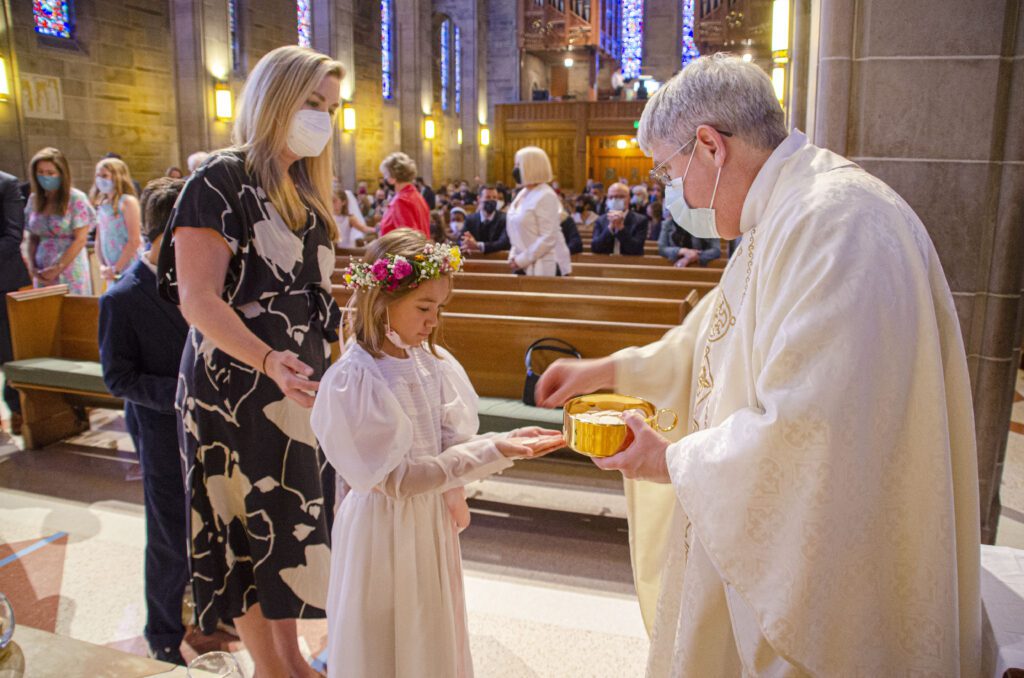
Our Financial Health
Thanks to solid management and your ongoing, generous financial support, the Cathedral continues to maintain a strong overall financial position. For the fiscal year (July 1, 2020-June 30, 2021), our total income exceeded our expenses by $179,168.
The Balance Sheet
At the start of the pandemic, the Small Business Administration issued loans to qualified businesses and nonprofit organizations through the Paycheck Protection Program (PPP). The church and school received that loan in May 2020. We both received forgiveness of our PPP loan in May 2021.
We continue to pay down our loan to the Archdiocese on the Hyland Center. At the end of the fiscal year, $3.6 MM remained on the loan*. Thanks to all of those that have fulfilled their pledges and those that continue to make payments!
Statement of Activities
In our Statement of Activities, you’ll note that we listed -$47,667 under Other Income. That largely represents the shortfall to our Archbishop’s Annual Appeal goal †. In 2019-20, we exceeded our goal and received a rebate from the Archdiocese. Thank you to those who support the Archbishop’s Annual Appeal!
Our most notable increase in expenses was in Security, Traffic Control and Grounds. With fewer events happening on campus, we decided to maintain security officers on campus 24/7, which required additional funds. We continue to evaluate other ways that we can ensure the safety of all of those visiting our campus.
Towards the bottom of the Statement, you’ll notice a change in the Archdiocesan School Subsidy for Education. Each parish financially supports the Catholic schools of the Archdiocese. Last year, the Archdiocese revised the formula it uses to assess parishes’ obligation to Catholic schools. This resulted in over $480,000 in savings. We used that savings to offset some increased COVID-19-related expenses, including Janitorial and Security.
Campus Improvements
After 11 years of heavy use, it was time to replace the turf on the greenspace. We shared the expense with the school and Parent Volunteer Association, and the new turf was installed in August 2021. We also entered into an amended agreement with our neighbors regarding our use of the greenspace. We are happy to report that starting this fall, we will host U8 and younger soccer games on Saturdays. These programs continue to grow and we are happy to see our community so supportive of our recreational activities.
Looking ahead, we are undertaking a hardscape and landscape project on Peachtree Way to improve upon some safety features, rehabilitate our landscaping, and repair damage to our hardscapes. This project will be funded by reserves.
We know the sound in the Cathedral needs improvement, and it is a priority for us in 2022. A plan to upgrade and enhance the Cathedral sound system as well as the sound and video in Kenny Hall is underway. We have selected a contractor and equipment has been ordered. Once we have the lead times for equipment and timing for installation and programming, we will share more details.
*The dollar amount of the outstanding pledges was slightly higher than the loan balance at the end of the fiscal year.
† If we do not reach the goal set by the Archdiocese, we must pay the difference out of the Offertory.

